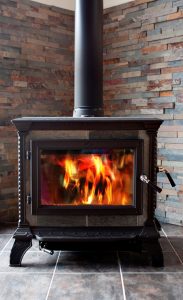Wood burning stoves have become increasingly popular in Cambridgeshire homes, from Victorian terraces in central Cambridge to period properties in Ely and newer builds in Newmarket. But what makes them such an attractive heating option for our region? Let’s explore the benefits and essential maintenance requirements of wood burning stoves.
The Efficiency Challenge of Open Fires
Many historic properties across Cambridge and its surrounding areas feature traditional open fireplaces. While these add character to our region’s beautiful period homes, they’re surprisingly inefficient. According to the Guild of Master Chimney Sweeps, open fires typically operate at just 15-30% efficiency, meaning most of your heat literally goes up the chimney.
Consider these striking facts about open fires:
- They can cause 10-15 air changes per hour in a room
- Every 4 minutes, almost all the warm air in the room escapes through the chimney
- Even when not in use, they continuously draw warm air from your home
- In conservation areas of Cambridge, where many properties maintain original features, this can significantly impact heating costs
Why a Wood Burning Stove?

Modern wood burning stoves offer a dramatic improvement in efficiency, particularly relevant for our local climate. Recent data from HETAS shows that contemporary wood burning stoves can achieve efficiency ratings of 80% or higher, making them significantly more economical to run.
Key benefits for Cambridgeshire homes:
- Controlled heat output suitable for various property sizes
- Reduced heat loss compared to open fires
- Lower fuel consumption and better environmental impact
- Ideal for period properties common in areas like Saffron Walden and Ely
- Excellent supplementary heating during East Anglia’s cold winters
Regular Maintenance: Essential for Safety and Efficiency
While wood burning stoves are highly efficient, they require regular professional maintenance to maintain their performance and safety. According to Cambridgeshire Fire and Rescue Service statistics, proper maintenance can significantly reduce the risk of chimney fires.
Professional stove servicing should include:
- Comprehensive cleaning of the stove and flue
- Inspection of seals and firebricks
- Component checks and adjustments
- Safety verification of carbon monoxide alarms
- Assessment of ventilation requirements
Local Considerations for Stove Owners
In the Cambridge region, several factors affect wood burning stove operation:
- Local conservation area regulations in historic districts
- Specific requirements for listed buildings in areas like Ely and Saffron Walden
- Considerations for properties in Cambridge’s smoke control areas
- Regional weather patterns affecting flue performance
Expert Stove Servicing Across Cambridgeshire
At Ablewight Chimney Services, we provide professional stove servicing throughout Cambridge and within a 25-mile radius, including Huntingdon, St Ives, and St Neots. Our HETAS-approved technicians understand the unique challenges of maintaining stoves in both historic and modern properties across our region.
For optimal performance and safety, we recommend:
- Annual stove servicing before the heating season
- Regular chimney sweeping to prevent tar build-up
- Professional CCTV surveys to assess flue condition
- Prompt attention to any operational issues
Making the Most of Your Wood Burning Stove
To maximise efficiency and minimise environmental impact:
- Use only well-seasoned wood with less than 20% moisture content
- Ensure proper ventilation according to building regulations
- Schedule regular maintenance with certified professionals
- Monitor stove performance throughout the heating season
Frequently Asked Questions About Wood Burning Stoves
As Cambridgeshire’s chimney specialists, we’re often asked these questions about wood burning stoves and their maintenance.
Why Choose a Wood Burning Stove Over an Open Fire?
Modern wood burning stoves offer significant advantages:
- 80% efficiency compared to 15-30% for open fires
- Better heat control and distribution
- Lower fuel consumption
- Reduced heat loss
- Improved environmental impact
- Ideal for period properties
What Regular Maintenance Is Required?
Essential maintenance includes:
- Annual professional servicing
- Regular chimney sweeping
- Component and seal checks
- Safety system verification
- Ventilation assessment
What Local Regulations Apply?
Cambridgeshire-specific considerations include:
- Conservation area requirements
- Listed building regulations
- Smoke control area compliance
- Building regulation requirements
- Local authority guidelines
How Can I Maximise Efficiency?
Follow these key guidelines:
- Use properly seasoned wood (under 20% moisture)
- Maintain adequate ventilation
- Schedule regular professional servicing
- Monitor stove performance
- Address issues promptly
When Should I Schedule Servicing?
We recommend:
- Annual service before winter
- Regular chimney sweeping
- CCTV surveys when needed
- Immediate attention to problems
- Pre-winter season checks
Need Professional Stove Servicing?
Whether you’re in a Victorian terrace in central Cambridge or a country home near Royston, proper maintenance is crucial for safe and efficient stove operation. Our experienced team provides comprehensive stove servicing across Cambridgeshire.
Contact us today:
- Phone: 01223 627012
- Email: hello@ablewight.co.uk
Regular servicing not only ensures safety but also maintains your stove’s efficiency, helping you stay warm while controlling heating costs during our region’s chilly winters.
Why Choose Ablewight?
- HETAS registered professionals
- Guild of Master Chimney Sweeps certified
- Trading Standards Approved
- Extensive local experience
- Comprehensive chimney services
- Expert advice


